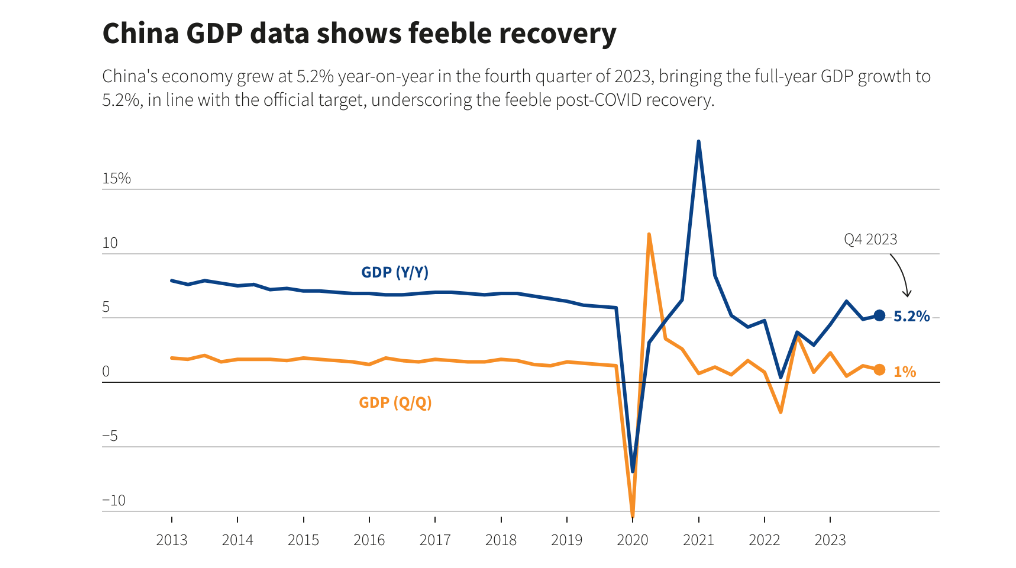China's 2023 economic growth 'hard won,' challenges expected for 2024
 China's 2023 economic growth 'hard won' (Getty Images)
China's 2023 economic growth 'hard won' (Getty Images)
In 2023, China's economy boosted by 5.2%, even more than the official goal. However, the world’s second-largest economy's recovery from the pandemic wasn't as smooth as expected. There were problems like a worsening property crisis, increasing risks of deflation, and weak demand, making the prospects for this year uncertain, according to Reuters and Inquirer.net.
Many experts thought China would quickly recover after COVID-19, but that did not happen. Confidence among consumers and businesses was low, local government debts were rising, and global growth was slowing down.
Gross domestic product (GDP) raised 5.2% in October-December from a year earlier, speeding from 4.9% in the third quarter, according to the National Bureau of Statistics (NBS) data.
China GDP 2013-2023 (LSEG Datastream/Reuters)
According to a survey by China Beige Book International, the disappointing recovery is over. "Any true acceleration (this year) will require either a major global upside surprise or more active government policy," the statement says.
Expectations for this year
While policymakers expect to maintain a growth target of around 5% for this year, analysts doubt it can be achieved even with additional stimulus. “Although the government met its 2023 GDP growth target of ‘around 5 percent’, achieving the same pace of expansion in 2024 will prove a lot more challenging,” said Julian Evans-Pritchard, head of China Economics at Capital Economics.
The property crisis and reliance on debt-driven investment are major challenges. Kang Yi, the chief of the NBS, acknowledged that China's growth in 2023 was “hard won” and stressed the complexity of the external environment and the anticipated lack of demand in 2024 as significant challenges for the economy.
“At present, our country’s government debt level and inflation rate are both low, and the policy toolbox is constantly being enriched,” Kang said.
Stocks in China and Chinese firms in Hong Kong dropped after the data was released, leading to concerns about the need for more interest rate cuts and support measures. Real estate data was particularly worrying, with new home prices falling, property sales decreasing, and new construction starts plunging.
The job market is also facing challenges, with a rising unemployment rate and delayed construction projects affecting consumer confidence. China's population also fell for the second consecutive year in 2023, raising concerns about the country's long-term growth prospects.
Recent data indicates that China's economy is starting 2024 on shaky ground, and achieving the same growth pace in 2024 as in 2023 will be difficult.
Post-pandemic recovery in Europe
Last year, Germany's economy weakened for the first time since the COVID-19 pandemic started, according to recent data. The GDP, which measures the country's economic activity, was 0.3% lower in 2023 compared to the previous year.
This decline in Germany's economy is concerning because Germany is the largest economy among the 20 countries using the euro. A survey by the World Economic Forum suggests that many economists expect weak growth in Europe in 2024, and more than half of them anticipate a global economic slowdown this year.

